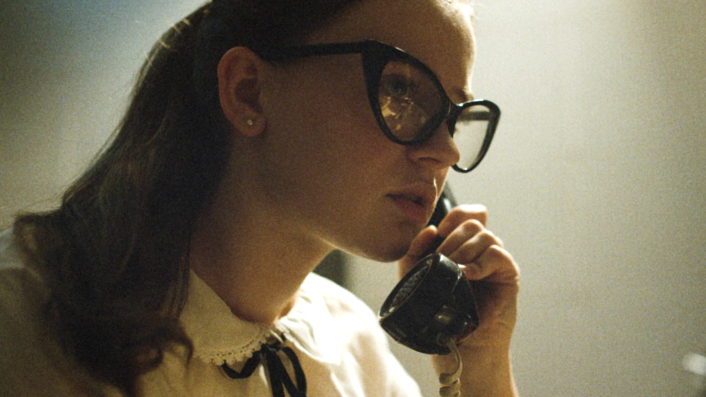Enthralling sci-fi The Vast of Night is one of the year’s best surprises

Now streaming on Prime Video, the audacious low budget feature The Vast of Night is getting everybody talking. It’s a beautifully crafted mind-bender, writes critic Luke Buckmaster.
Director Andrew Patterson’s gripping low budget sci-fi movie, about strange goings-on in the sky in a backwater American town circa the 1950s, has arrived like a bolt from the blue—with no star power or zeitgeisty subject to rouse it from homepage algorithms. This nifty, cleverly made film has the aura of an old curio found on a dust-covered shelf in an antique store, next to the monkey’s paw and the ouija board. And it has the energy of a hallucinatory throw-everything-at-it first-time feature—comparable in that sense to Richard Kelly’s Donnie Darko, Rian Johnson’s Brick and Jennifer Kent’s The Babadook.
See also:
* All new movies & series on Prime Video
* Best new movies & series on Prime Video
* All new streaming movies & series
The narrative unfolds over a single night in the fictional location of Cayuga, New Mexico, where almost all the residents are attending a basketball game. There isn’t much else to do in this here neighbourhood—with the exception of listening to a radio program hosted by local celebrity Everett (Jake Horowitz). On this particular evening his show features an unusually compelling segment: the airing of a very strange sound that may or may not have come from a flying saucer.
Switchboard operator Fay (Sierra McCormick) shares the sound with Everett after receiving a call from an anxious woman commenting on something weird in the sky. Somebody listening to the radio program recognises the sound and calls in, then…well, let’s leave it there. The Vast of Night is a difficult (if not impossible) film to spoil, because Patterson prioritizes staging over story and often atmosphere is everything. But its simple linear narrative might have more impact if you go in relatively cold.
Patterson and cinematographer M.I. Littin-Menz rebel against contemporary cinema’s obsession with jittery handheld images and overwrought editing, making a game of keeping shots long and measured. This puts pressure on themselves to remain visually interesting—a challenge they more than meet—while pushing the actors into a space that begins to resemble recorded theatre. The actors also more than rise to the occasion. Jake Horowitz and Sierra McCormick share an appealing, perhaps-platonic-perhaps-not chemistry, bringing to mind young gumshoes like The Hardy Brothers or Nancy Drew, with a journalistic desire for details. They have the narrative function of a high-powered sponge, soaking up people’s stories.
The camera is a character too and a stubborn one at that—regularly avoiding looking characters in the face (especially early on) and sometimes slumping it behind them, observing their backs, as if conscious of its own presence. Occasionally the camera simply ups and leaves, in one long shot for instance bolting away from Fay to tear down the town’s main road, then through side streets and alleys, across lawns, down driveways and through carparks, running around like a cut snake. The visual language of the film—coloured graded with a fuzzy, musty, faux time capsule texture—is eerily well measured and deliberated, until all of a sudden it runs wild.
The actors, particularly in the first half, speak at a rate significantly faster than real-life: a technique used extensively in screwball comedies, when the likes of Howard Hawks and Preston Sturges belted around dialogue as verbal ping pong, turning words into sport. In The Vast of Night this creates an intriguing schism: rapid-tongued gasbagging contrasted with gradual visual motion and an aversion to cutting.
In the second half the rapid speech is scaled back to accommodate a more drip-drip-drip feel, a couple of small but important side characters recounting monologues encompassing extraordinary experiences. These moments have a surreal literary quality: as if we are being read from the journal of a Lovecraft madman or a Poe narrator scribbling frantically by candlelight, at times with rhythmic structures. “I’ve seen good people go bad and smart people go mad,” says one weary old lady in the dim light of her living room, towards the end of a fantastic tale that she is well aware will probably not be believed by those listening.
The Vast of Night is kind of a wild ride, but also kind of quaint—and in a sense is purely an elaborate throwback. Patterson explains its context visually and cleverly, with an early establishing shot roaming into the space of an old TV set broadcasting a Twilight Zone-esque program. The film is a strikingly idiosyncratic excursion into style and mood, saluting an era when spectacle didn’t mean ironic, or bombastic, or self-conscious (though there is an element of that here), or directed by algorithm, or part of an elephantine pop culture portal to nowhere (like the MCU). Patterson has put himself on the map and the pressure is on for his follow-up one; one can only hope it won’t be Marvel or Star Wars.

















